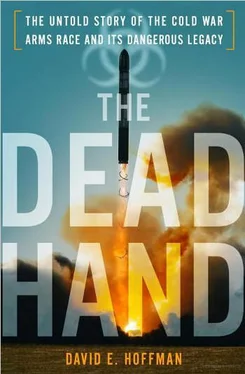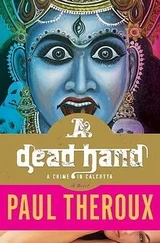“However,” he reassured Gorbachev, “any possible leak of information by Pasechnik, who is a narrow specialist, will not cause damage in revealing our scientific and technical achievements in this field, but might provide a basis for Western countries to question the Soviet Union’s compliance with the Biological Weapons Convention.” Zaikov told Gorbachev that the Soviet Union had given the United Nations
a complete list of the names and locations of 17 facilities that handle high-risk infectious materials, including facilities developing defensive means against biological weapons. At the same time, the USA disclosed only six such facilities, although some data indicate there are far more than that.
In fact, the Soviet declarations to the United Nations were woefully incomplete, failing to include some of the secret mass-production facilities or the offensive nature of the Soviet program.
Zaikov closed the letter by telling Gorbachev that “if the issue arises” of mutual visits to biological facilities “in order to lessen concerns about their activity,” the Americans could be invited to Koltsovo, Obolensk and the older military laboratory at Kirov. Zaikov said the Soviets should demand access to three American sites. 35
Gorbachev’s reaction to the Zaikov letter is not known, but events moved quickly after he received it. Baker had just arrived in Moscow for meetings to plan the upcoming summit in Washington. He did not raise biological weapons at any of the regular negotiating sessions in the Soviet capital. But on May 17, Shevardnadze invited Baker on a sightseeing trip to Zagorsk, a town forty-three miles northeast of the Kremlin with a famous Russian Orthodox monastery. At Baker’s request, MacEachin, who was also in Moscow, assembled a short paper outlining what the United States knew, and he gave it to Baker. As they cruised to Zagorsk in Shevardnadze’s ZIL limousine, flying Soviet and American flags on the front, with no aides but two interpreters in the car, Baker raised the issue of biological weapons and handed the paper to Shevardnadze. Baker recalled that Shevardnadze said, in the present tense, “he didn’t think it could be so, but he would check it out.” Ross recalled the paper was a special effort to make sure Shevardnadze knew Baker took the issue seriously and wanted a response. 36
The next day, May 18, the British defense secretary, Tom King, was in Moscow and held formal talks with Dmitri Yazov, the Soviet defense minister. King also pressed Yazov about biological weapons. Yazov said it was inconceivable that the Soviet Union would have a policy of developing biological weapons. Yazov’s manner was hopelessly clumsy, recalled Braithwaite, the British ambassador, who was present. “Yazov muttered to his aide that the British had presumably learned something from ‘that defector,’ went red in the face, but blandly denied all knowledge,” Braithwaite recalled. 37
Before his departure for Washington, Baker saw that the Gorbachev revolution was running aground. Negotiations on nuclear arms control—the unfinished business of Reykjavik—were “going nowhere slowly.” Baker wrote to Bush from Moscow: “The economic problems, the public mistrust, the sense of losing control, the heat of the nationality issue, and concerns about Germany, are all weighing very heavily.” Baker said he left “with an overriding impression that Gorbachev was feeling squeezed.” Germany was “overloading his circuits,” and “the military now seemed in charge of arms control.” 38
A troubled Gorbachev returned to Washington for a summit May 31, 1990. Two years had passed since his sunny walk in Red Square with Reagan. Bush had finally come around to the belief that Gorbachev was a genuine reformer. In the weeks before the summit Bush called Gorbachev a “tremendous statesman” and “bold Soviet leader” who tried to “initiate daring reforms.” But the hour was late. On Saturday, June 2, Bush and Gorbachev helicoptered together to Camp David, the 143-acre presidential retreat in the Catoctin Mountains of Maryland. Bush recalled they were each accompanied by military aides carrying the briefcases that would link each of them to their command posts in the event of nuclear war.
Bush persuaded Gorbachev to change out of his suit and tie into a sweater for an informal discussion at Aspen Lodge, sitting at a glass table on the veranda, overlooking the pool, golf course and putting green. Gorbachev was joined by Akhromeyev and Shevardnadze; Bush by Baker and Scowcroft. The sky was clear and a breeze rustled through the trees. Much of the discussion was about regional conflicts around the world, including Afghanistan. 39Gorbachev recalled that at one point during the day, Bush called him aside for a very private chat. “It was just the two of us and my interpreter,” Gorbachev said.
Bush told Gorbachev that the CIA was reporting that the Soviet Union had not destroyed all its biological weapons and production facilities.
“I said,” Gorbachev recalled, “my intelligence people report that you have not destroyed all your biological weapons. I believe you, I said, but why don’t you believe me?”
Bush: “Those are the reports I get.”
Gorbachev: “Well, you are not an expert on biological weapons. And I am not an expert on biological weapons. Let us have mutual verification, mutual verification of whether biological weapons have been destroyed. Let your people come to our weapons facilities, we also know where your facilities are, and we will come to your country. Let’s have an exchange.”
Gorbachev was trying to deflect Bush, just as Zaikov had suggested.
According to Gorbachev’s account, Bush responded to the idea of an exchange by proposing that the Americans should check the Soviet Union first. 40
Years later, when Gorbachev was asked directly whether he knew that Biopreparat existed, he seemed uneasy. His reply was vague. “No, I can’t say I remember dealing with that organization,” he said. “But there was medical research and they make vaccines against epidemics. Where is the line, the point where research becomes biological weapons and production? This is still controversial, even today, because you need cooperation, you need the kind of international relationship to make it possible to get rid of those weapons.” Gorbachev then quickly changed the subject. 41
When Thatcher met with Gorbachev in Moscow on June 8, she also raised with him “the evidence which we had gleaned that the Soviet Union was doing research into biological weapons.” It was something “which he emphatically denied,” she recalled, “but nonetheless promised to investigate.” 42
In July 1990, Baker gave Shevardnadze another paper outlining American concerns about biological weapons. 43Shevardnadze had invited Baker for a relaxing visit to a scenic area of Siberia in early August. Before they met, however, Shevardnadze needed to come up with an answer to the Western protests. On July 27 and again on July 30, a group of officials gathered at Zaikov’s office in Moscow to draft talking points that Shevardnadze would use to respond to Baker. According to the talking points, found in Katayev’s files, the group decided to preserve the facade. 44
Baker and Shevardnadze spent most of August 1 boating and fishing on idyllic, mile-deep Lake Baikal. When they got around to discussing arms control, Shevardnadze was guided by the papers written in Zaikov’s office: six neatly typed, double-spaced pages. Shevardnadze opened with a solemn declaration that he took the American and British complaints with “utmost seriousness.” Then he said, “I can state that at the present time no activity is being carried out in the Soviet Union that would violate the articles of the convention on prohibition of biological weapons. We have no biological weapons.”
Читать дальше












